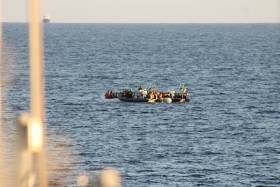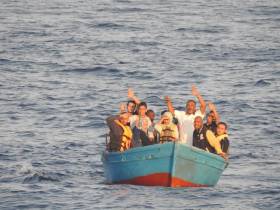Displaying items by tag: Migrants Rescued
LE Samuel Beckett Rescues More than 500 Migrants
#MigrantsRescue - LÉ Samuel Beckett located and rescued a total of 508* migrants from four separate rubber vessels in the early hours of yesterday morning.
The search and rescue operation according to the Naval Service took place 50 nautical miles NW off Tripoli, Libya and was at the request of the Italian Maritime Co-Ordination Centre.
The first rescue operation began at 02.20am and all migrants were taken on board LÉ Samuel Beckett by 12.20pm. The 508* migrants received food, water and medical treatment where required.
This brings to 2,818* migrants rescued by the LÉ Samuel Beckett since it deployed to the area of operations on 23rd September of this year.
LÉ Samuel Beckett will now bring all rescued persons to a designated Port of Safety.
*Figures for the operation are provisional until confirmed by the Italian authorities.
LÉ James Joyce Rescues Migrants In Three Incidents
#MigrantRescue -LÉ James Joyce has rescued a total of 165* migrants in three separate vessels during search and rescue operations north-east of Tripoli,Libya
The search and rescue (SAR) request came earlier today from the Italian Maritime Rescue Co-Ordination Centre.
During the first operation, 15* migrants were rescued from a wooden vessel located 40 nautical miles north-east of Tripoli. The rescue commenced at 6.40am and all migrants were taken on board LÉ James Joyce and are now receiving food, water and medical treatment where required.
The LÉ James Joyce was re-tasked to assist with the rescue of a further 150* people from two rubber vessels also located 40 nautical miles north-east of the Libyan capital. The second rescue commenced at 7.50am and all migrants are currently on board.
A further search and rescue operation is currently underway.
*Figures for today's operation are provisional until confirmed by the Italian authorities.
LÉ James Joyce departed Naval Service Headquarters in Haulbowline, Cork to assist the Italian Authorities in operations in the Mediterranean in May The OPV90 class ship first deployment in SAR began on 8 July.

























































